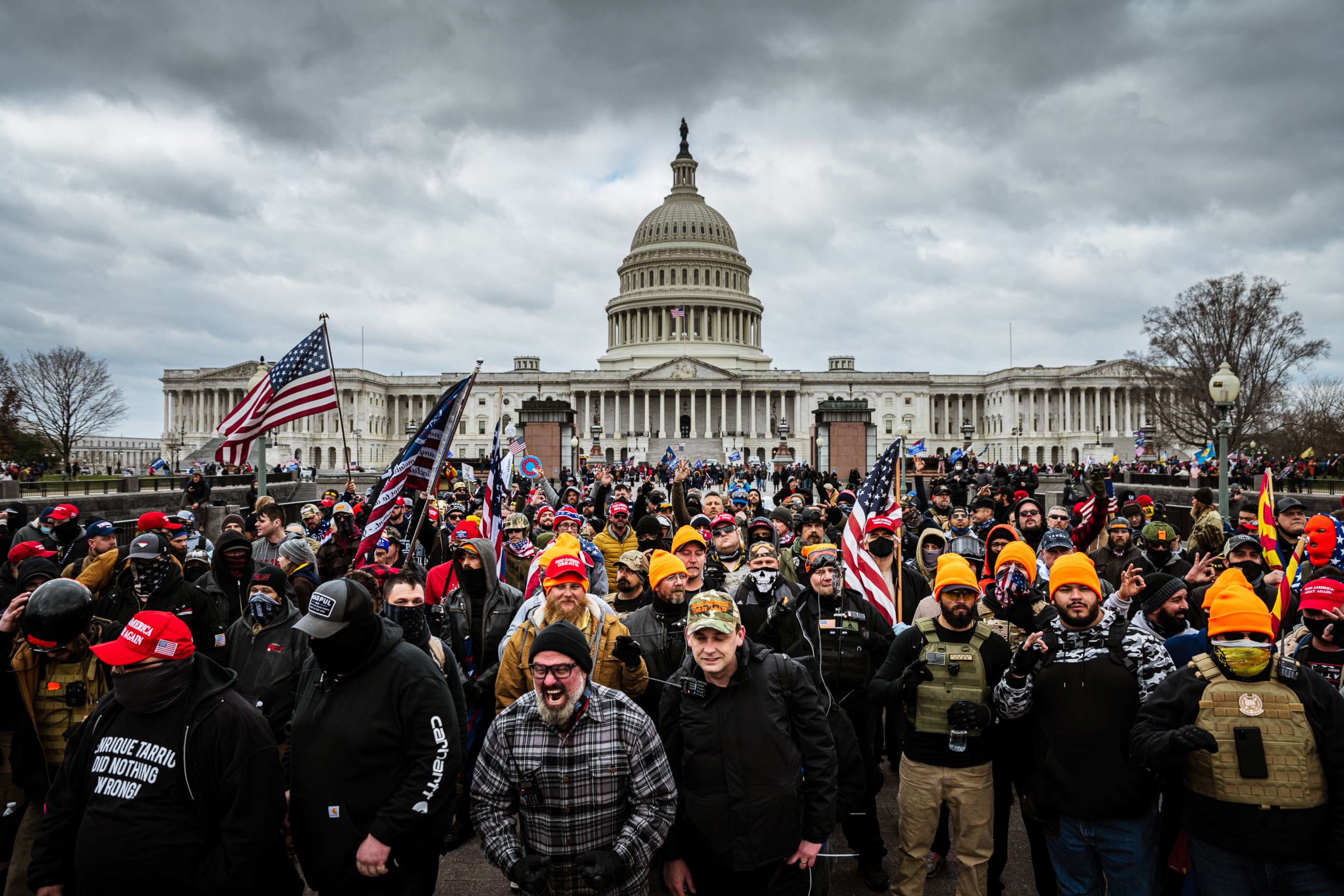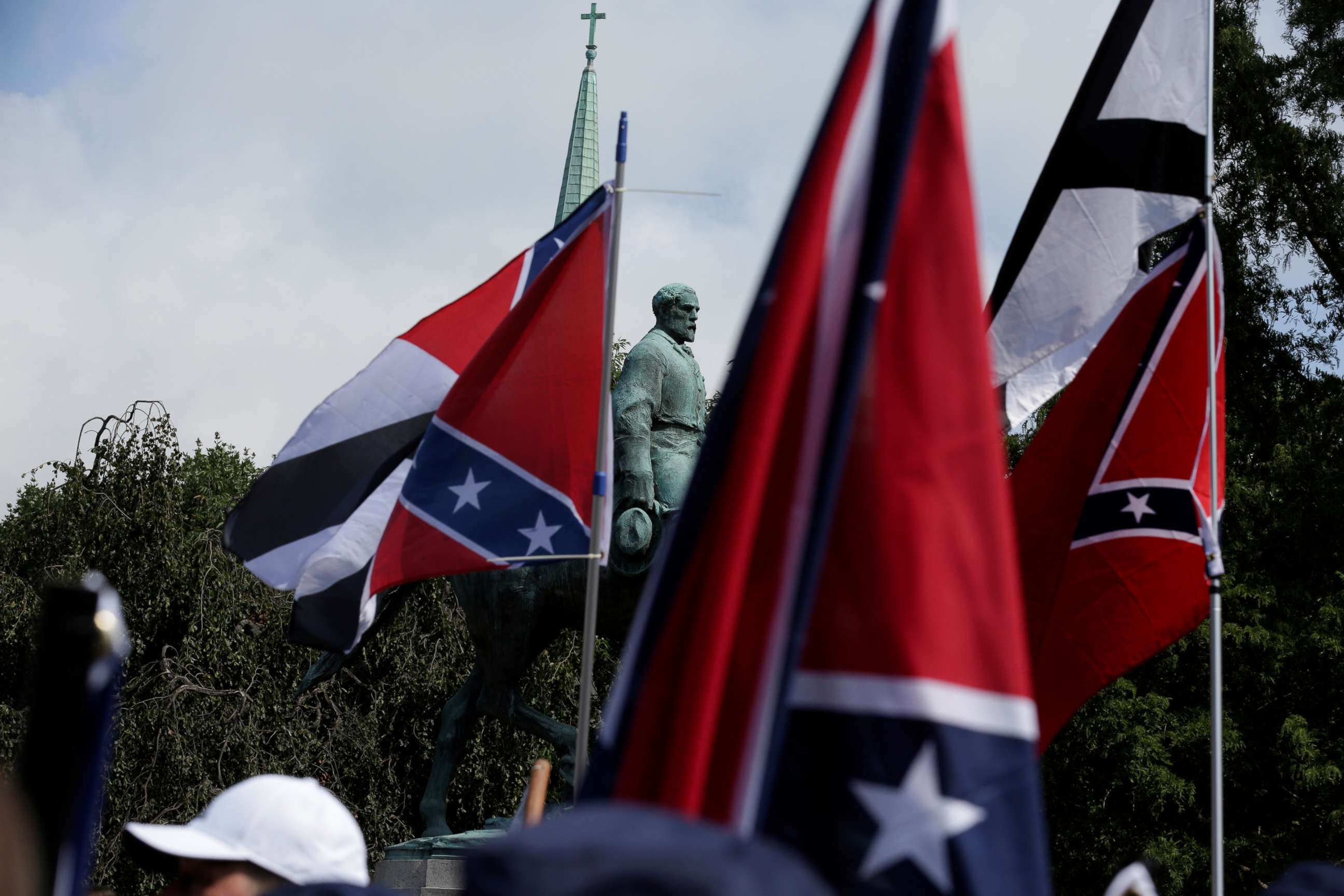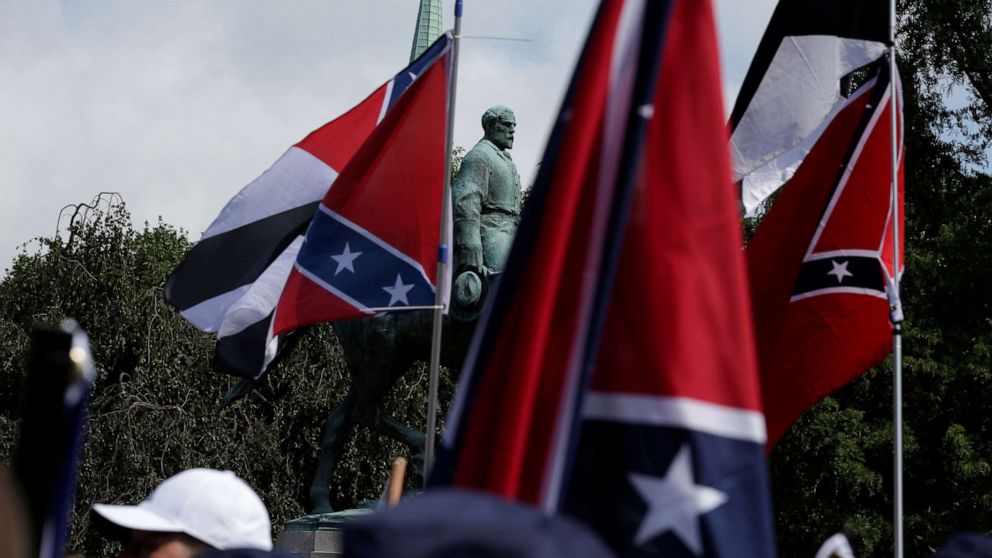White supremacists 'seek affiliation' with law enforcement to further their goals, internal FBI report warns
In some cases, they wanted to join the military or police so they would be able to commit acts of violence toward members of minority groups.
In others, they planned to join the military or police to learn how to wage war against members of those minority groups.
Based on investigations between 2016 and 2020, agents and analysts with the FBI's division in San Antonio concluded that white supremacists and other right-wing extremists would "very likely seek affiliation with military and law enforcement entities in furtherance of" their ideologies, according to a confidential intelligence assessment issued late last month.
The document, obtained by ABC News, was distributed to law enforcement agencies both in Texas and elsewhere in the country. It focuses on extremists inspired by the white-supremacist publication "Siege," which served as motivation for the neo-Nazi group known as "Atomwaffen Division," among others. The report is titled "Siege-Inspired Actors Very Likely Seek Military and Law Enforcement Affiliation, Increasing Risk of Tradecraft Proliferation and Color of Law Offenses in the FBI San Antonio Area of Responsibility."
Conclusions in the assessment were based on information from records and informants, some of whom had "excellent access," the FBI authors wrote in the Feb. 25 document.
"In the long term, FBI San Antonio assesses [racially motivated violent extremists] successfully entering military and law enforcement careers almost certainly will gain access to non-public tradecraft and information, enabling them to enhance operational security and develop new tactics in and beyond the FBI San Antonio" region, the document said.
FBI spokesperson Katherine Gulotta said that "FBI field offices routinely share information with their local law enforcement partners to assist in protecting the communities they serve." She did not specifically address the content of the report.
Critics say the document once again shows the nation's top law enforcement agency has been slow to deal with the problem of white-supremacist infiltration of police and the military, even as FBI agents watched evidence mounting.
"When we asked the FBI last year to testify about white supremacists executing plans to infiltrate law enforcement entities across America, the bureau refused and told us it had no evidence that racist infiltration was a problem," Rep. Jamie Raskin (D-Md.) said in a statement. "Now, the January insurrection -- and the growing evidence of off-duty law enforcement officers being involved in the attack on Congress -- and this newly leaked report confirm in my mind that the FBI's failure to level with the American people about organized racist infiltration of law enforcement is having dangerous and deadly consequences."

Raskin, the chairman of the House Civil Rights and Civil Liberties Subcommittee, led a hearing last year on white supremacy and the federal government's response to the problem. He also released a report detailing FBI warnings about the way white supremacists infiltrate law enforcement, and said the bureau was reluctant to deal with the problem during the Trump administration.
"We are continuing to press the FBI for information about how it plans to counteract the contagion of white supremacist infiltration of law enforcement bodies," Raskin said after learning of the newly released report. "The FBI must answer specifically for what it is doing to combat white supremacist infiltration of law enforcement. It must work to root out officers who seek state power to terrorize our communities under color of law."
Addressing the issue of violent extremism, FBI Director Christopher Wray told lawmakers last week that the bureau has been "sounding the alarm" about the rising domestic terror threat for "a number of years now."
Testifying before the Senate Judiciary Committee, Wray said that there are currently 2,000 domestic terrorism investigations, up from almost 1,000 when he first started in 2017.
"Whenever we've had the chance we've tried to emphasize that this is a top concern and remained so for the FBI," Wray said. "The FBI will not tolerate agitators and extremists who plan or committed violence. Period. And that goes for violent extremists, of any stripe."
The authors of the Feb. 25 report wrote that their assessment is "based on evidence [extremists] expressed a desire to join the military and law enforcement primarily to obtain tradecraft to prepare for and initiate a collapse of society, specifically by engaging in violence against the US government and specified racial and ethnic groups. Online peers encouraged them to seek these careers and [extremists] built relationships with associates seeking military employment, focusing on the associates' current and future martial skills."
In addition, the report says extremists are "likely to seek to exploit familial and social connections when pursuing military and law enforcement employment, reducing obstacles and increasing opportunities ... to acquire tradecraft."
Since the Jan. 6 attack on the U.S. Capitol, lawmakers and officials have increasingly focused on the issue of white supremacy and other types of violent extremism in the military and law enforcement. According to research by news organizations including The New York Times, at least 30 people with law enforcement training have been tied to the events of the insurrection, which left five dead, including a Capitol Hill police officer.
The Pentagon is so concerned about right-wing extremism and white supremacy in the ranks that the entire military has been ordered to do a one-day "stand down" to address the problem.
"This is behavior that can really tear at the fabric of our institution," Defense Secretary Lloyd Austin told ABC News' Martha Raddatz Sunday on This Week. "And so we want to make sure that our troops are reminded of what our values are, reminded of the oath that we took coming in."

Former FBI Agent Michael German, whose expertise was infiltrating white supremacist groups for the bureau, said he continues to be troubled by the way FBI leadership is dealing with the problem.
"In 2006, the FBI warned in writing that white supremacists seek to infiltrate law enforcement, and its 2015 Counterterrorism Policy Guide instructed agents conducting domestic terrorism investigations of white supremacists and far-right militias to modify their tactics because the subjects of these investigations often have 'active links' to law enforcement," German said. "Yet when Congress sought answers about what the FBI was doing to address this threat, FBI managers disavowed the intelligence."
German, now an author and fellow at the Brennan Center for Justice at New York University Law School, said that the new report from San Antonio "makes clear that white supremacist infiltration of law enforcement and recruitment from the ranks continued to be a problem even as their superiors disavowed it. When FBI managers won't accept intelligence reports coming from their agents working the streets, it is no wonder intelligence failures like the Capitol attack occur."
"The problem isn't a lack of intelligence or barriers to collection," German said. "It is that FBI managers continue to ignore the intelligence they receive if it doesn't fit their preferred narratives about what the terrorist threat looks like."
FBI spokesperson Gulotta did not respond to ABC News' questions about the criticism.




